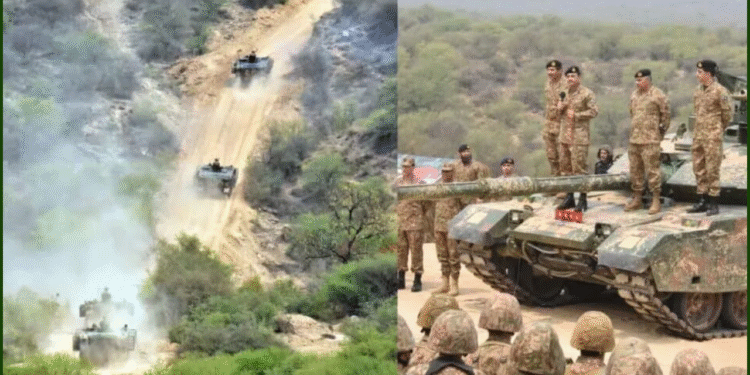RAWALPINDI, May 1, 2025 — General Asim Munir, Pakistan’s Chief of Army Staff, issued a stern warning to India on Thursday, stating that any military missteps would trigger a swift and decisive response. His remarks came during a visit to the Tilla Field Firing Ranges, where he oversaw a major combat exercise aimed at showcasing Pakistan’s military readiness.
The exercise, dubbed Thunder Bolt, involved the army’s elite Strike Corps and featured a dynamic display of integrated warfare capabilities. From precision-guided munitions to combat aviation and advanced battlefield engineering, the drill demonstrated Pakistan’s ability to operate seamlessly across multiple domains. General Munir praised the troops for their discipline, tactical prowess, and high morale, emphasizing that such exercises reflect the military’s commitment to staying at the forefront of modern warfare.
“Pakistan stands for peace and stability in the region, but our resolve to protect our sovereignty is ironclad,” Munir said, according to a statement from the military’s public relations office. He underscored the importance of continuous training and technological upgrades in maintaining a robust defense posture.
The large-scale exercise saw participation from various branches of the armed forces, with senior commanders and defense officials in attendance. The event highlighted Pakistan’s focus on enhancing interoperability and adopting cutting-edge strategies to counter emerging threats.
Rising Tensions in the Region
General Munir’s comments come at a time of heightened friction between Pakistan and India, following a deadly attack on April 22 in Pahalgam, a town in Indian-administered Jammu and Kashmir. The assault, which claimed 26 lives, mostly civilians, has fueled accusations and counterclaims between the two neighbors. India has hinted at possible external involvement, a charge Pakistan has dismissed as baseless, urging a transparent and impartial probe into the incident.
In a recent address, Pakistan’s Prime Minister Shehbaz Sharif condemned the tendency to politicize such tragedies, reiterating Islamabad’s willingness to support an independent investigation. Similarly, Deputy Prime Minister and Foreign Minister Ishaq Dar emphasized Pakistan’s preference for de-escalation but warned that any aggressive actions would be met with a firm response.
International Calls for Restraint
The escalating rhetoric has drawn attention from the international community, with several nations calling for calm. The United States, China, and other key players have urged both Pakistan and India to engage in dialogue and avoid actions that could further destabilize the region. Diplomatic channels remain active as global leaders stress the need for a peaceful resolution to the ongoing disputes.
A Focus on Military Modernization
Thursday’s exercise underscores Pakistan’s broader strategy to bolster its defense capabilities amid evolving geopolitical challenges. The military has invested heavily in upgrading its arsenal, improving training regimens, and fostering innovation in combat tactics. Thunder Bolt, in particular, showcased the integration of advanced systems and the ability to execute complex operations under simulated battlefield conditions.
As regional dynamics continue to shift, Pakistan’s leadership remains focused on balancing its pursuit of peace with the imperative to maintain a strong, responsive military. General Munir’s visit to the firing ranges and his pointed remarks signal that the country is prepared to defend its interests while advocating for stability in South Asia.

















































